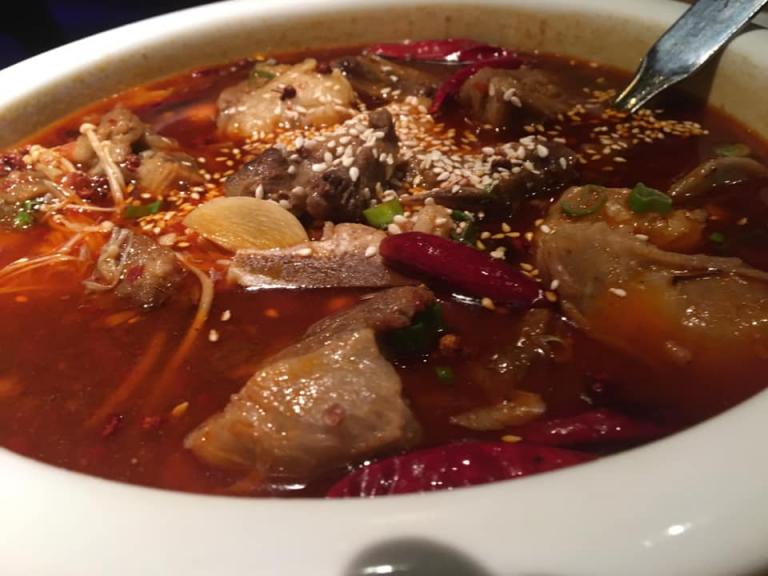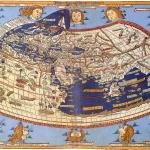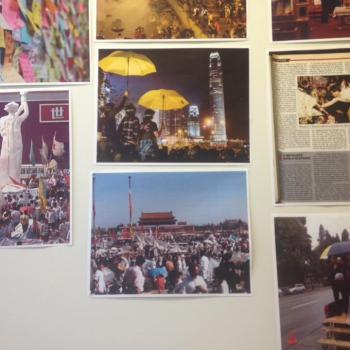
About a week ago, someone in my Eastern Catholic readership forwarded an article from LifeSiteNews concerning whether Catholics should celebrate the Lunar New Year. This acquaintance of mine shared in good faith and asked for comment; being of Newman’s persuasion that academics, unlike journalists, should not be commenting on everything, I ignored it. But like Candlemas on the New Calendar, my absorption into my daily secular life, which includes following the Old Calendar, had me forget that today was the Lunar New Year. What clued me in was everybody posting about in on Facebook. When my research assistant came to see me, I quickly persuaded him to go out for a fancy Sichuan dinner with me. It’s the best kind of Chinese food we can snag in Evanston. It was fantastic.
Readers of the Catholic blogosphere will perhaps think that being on Patheos Catholic obliges me to have a vendetta against LifeSiteNews for what they did to my editor, Rebecca Bratten Weiss, and through that attempting to start a proxy war through her at Steubenville’s English department for the supposed soul of Catholic culture. Maybe someone else can hit back, but I don’t think I have much of a right to talk. Raised evangelical, our family was proud to not know exactly when the Lunar New Year fell. We were sophisticated, unlike those who knew and were stuck in tradition. We were modern, assimilated, American, and Christian.
That fantasy, I think, is possible for a Chinese family to maintain as long as their children are unmarried. Marriage changes everything because not only do you have to engage another family, but nostalgia begins to creep in. There is something wrong with having a purely evangelical wedding. Something is missing: cake coupons on bridal invitations, door games to fetch the bride, a banquet with family, a tea ceremony where family heirlooms are exchanged. A number of Chinese Americans and Canadians, especially the Christian ones, tell the story of how they did not know that their parents were really traditional, especially as they usually forgot when Lunar New Year was, and then discovered that it was expected of them to budget all of these supposedly extraneous things into their planning. It’s so bad that I’ve become a kind of informal wedding consultant to a few of my friends. I live for such family drama.
What I’m saying is that our families are not nearly as secular as they used to be before we got married, and so part of how I discovered it was Lunar New Year, due to the secularity of my own life, was clueing in on why they were having such sumptuous suppers and sharing what amounted to food porn on our shared messaging apps. They are all still Christian — all of them Protestant, in fact, with more than an occasional side-eye or raised eyebrow at my Eastern Catholicism, accepting of me as they are — so there was no conversion that appeared to have taken place. I say this because some smart aleck will come by and tell me that in 1939 Propaganda Fide issued Plane compertum est to reverse the decrees of Clement XI and Benedict XIV during the seventeenth-century Chinese Rites Controversy, which basically amounted to the Pope of Rome rejecting a number of Jesuit innovations in inculturation like setting up ancestral tablets at the mass and referring to God as the ‘Sky.’ Plane compertum est argued that these Chinese rites, as they are construed even within traditional practice, are purely civic and social. Chinese scholars, of course, would say duh. We have a famously secular culture, suspicious and generally irreverent toward spirits and often making more of a show of respecting authority than actually taking them seriously, and I suppose it is nice that European Catholics figured it out after three hundred years of orientalist fantasizing. But that’s a story in the Latin Church, and having been to my share of Chinese Catholic masses for the Lunar New Year, I can sympathize with the detractors. But one must examine more deeply why one might cringe during such services. Sometimes the problem is not theological. At times, it is execution that is cringe-worthy.
In any case, that is the Latin Church, and the internal problems of my sister church are really not mine to deal with, full communion though we may share. More immediate to me are my evangelical family and community members with whom I still enjoy a vibrant social relationship, and being married and having thus litigated all the Chinese rites controversies that are possible for families to have at the small scale of a Chinese ethnoburb in Vancouver, celebrating the Lunar New Year is neither here nor there for us. If anything, it’s delicious. I just told my wife this morning that I finally figured out why we get year cakes every year around this time; our favourites are taro and radish. They’re for the new year. She gave me what all married men know as the look.
But examining the LifeSiteNews piece in the broader landscape of conservative Catholic crisis culture, I am reminded of the fascination that I had when I first dabbled in the Latin Church and ended up joining the Kyivan Church with the kaleidoscope of conservatives that these churches, and others too, manage to manufacture. It made me a bit more honest about evangelicalism too, where the minority of theological nerds who are dissatisfied with the popular culture of their ecclesial networks develop a fetish for all things linguistically Latin and even claim to be conservatives in the sense of trying to restore monarchy. I, too, have been tempted by this strain, though I think my waking up this morning and turning on Britney Spears is a sign that I have finally sold out. While listening one more time to Oops, I Did It Again, I had a reflection. There is a weird draw even for me to that LifeSiteNews piece and the nervousness about the oriental nonwestern that comes with it, and my impulse in speculation is to go where my colleagues in the English department (speaking of Stephen Lewis) have been very helpful, and that is in theorizing the malaise and melancholia that befell English literature in the wake of the British Empire’s fragmentation after the Second World War. How does one write, think, and dream when so much of one’s sense of moral character, theological certainty, and virtuous practice is based on an empire that no longer exists?
In thinking of this post-imperial melancholia, I found it remarkable that a number of reactionaries in the churches I’ve gone through – evangelicalism, Anglicanism, the Latin Church, and the Kyivan Church, with all of our awkward relations with the Orthodox – are basically reacting to this malaise. In fact, progressives and radicals do it too; it’s just that it’s in a much more celebratory tone than the conservatives, who pine for an imaginary past and opine that they were born in the wrong century. The crisis of Catholic culture, for example, is that the Latin Church, which used to be in charge, isn’t in charge anymore, and if they were to be honest, the shift from the Chinese Rites Controversy to Plane compertum est is symptomatic of the shift in power that now has the Vatican isolated on a hill in Rome, having finally resolved the question of what land is being supplied for its state by a fascist, no less. Constantine may have won the Battle of Milvian Bridge. But it is a little bit of a joke for the free churches to accuse the Constantinian churches of being imperialistic, since one by one, all the empires that were supposed to be in symphonia have fallen. What we are left with is nostalgia for the symphony, a zombie neo-imperialism that makes a wide tent of neo-traditionalists trying to recreate antiquated forms of liturgy to the installation of an oligarchic former KGB agent into the highest of Kremlin echelons.
Is this not, I reflected, the same situation in which we Chinese people in the modern world find ourselves? That my family has forgotten the Lunar New Year until we got married, and that I still carry vestiges of that amnesia, bespeaks the reconfiguration of Chineseness in the ideological battles of the twentieth century. Like the imperialist Christians of the Constantinian traditions — and really, this includes everyone reacting to them too, including the Anabaptists and the free churches whose claims to independence are generally refuted by their own histories — the trick is to figure out Chineseness after empire. It is one thing to say that our longstanding practice is encapsulated by mountain high, emperor far – that ordinary people living our everyday lives don’t think much about empire, except that it should be kept off in the distance and placated at all costs. It is quite another to not have it in the backdrop at all and therefore have to deal with all the fantasies about China and Chineseness that impinge much more directly on our everyday lives.
Perhaps the reflection that I am having on this Lunar New Year is that we are all trying to re-learn how to do life after empire, especially Christians in the post-Constantinian churches and Chinese people. If they want to adopt the posture of fear and orientalist paranoia on LifeSiteNews and the various networks of Catholic and Orthodox nostalgic crisis, then that’s their prerogative. But I, for one, am going to have fun with it. It is the Year of the Pig, and zodiac be damned (for one thing, as a Tiger, it is not relevant to me), the first thing I thought of was the offertory that is offered in all Chinese Anglican churches and the ones whose liturgies are derived from them, which is basically everyone else from the Presbyterians, Methodists, and Baptists to the independent ones from the Christ Church of China to the free churches. All things come from the Lord, and we give to the Lord what is the Lord’s, the Anglicans with ever such good intentions bestowed upon their colonial subjects in Hong Kong. The problem is that Cantonese, unlike English, is a very tonal language, and 萬物都是從主以來,我們把從主以來獻給主 (man mut do see chong ju yi loi, ngo moon bah chong ju yi loi heen cup ju) sounds an awful lot more like all things are bugs that come from the pig, we give all bugs from the pig to the pig (萬物都是蟲豬以來, 我們把蟲豬以來獻給豬). I like to think that in preserving these imperial mishaps in the liturgies we acquired from the colonizers, we everyday people make a mockery of empire every time we worship. But perhaps that is because I am in the Kyivan Church, worshipping among a peasant people playing at Byzantine imperial liturgy, often butchering it so badly that our daughters in Moscow overcompensated in souping it up beyond Greek recognition.












